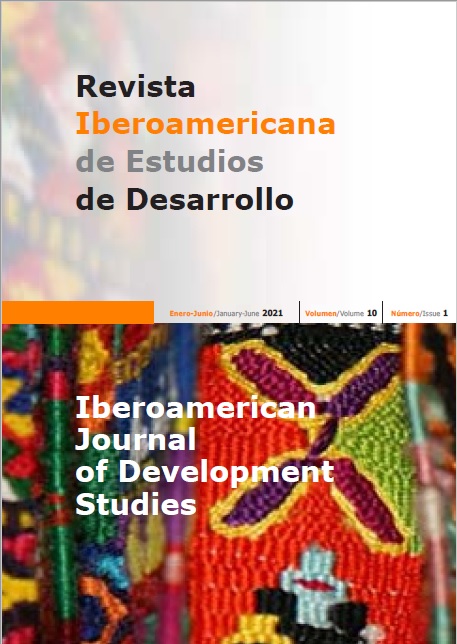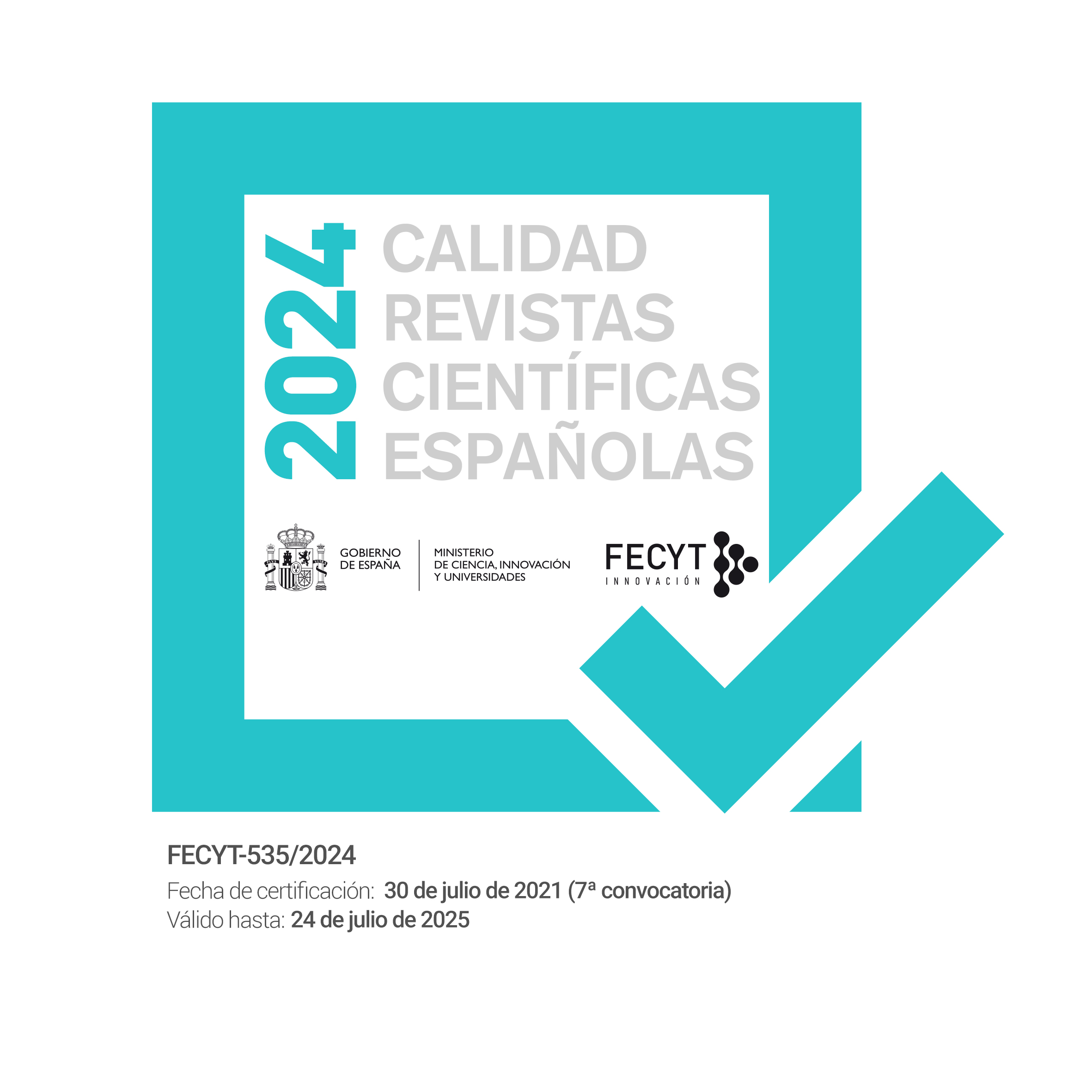Integration and economic transformation in Africa: potential and limitations of the African Continental Free Trade Area
DOI:
https://doi.org/10.26754/ojs_ried/ijds.565Keywords:
Africa, regional integration, AfCFTA, industrialisation, economic transformationAbstract
In March 2018, the African Union gave way to the establishment of the African Continental Free Trade Area, the largest area of economic integration in the world by number of countries involved.
As of June 2020, 54 out of 55 African Union member countries have already signed the agreement, thus showing an almost complete unanimity on this topic.
AfCFTA comes up when industrialisation strategies and economic transformation in Africa seem to have taken over orthodox structural adjustment and post-adjustment approaches. AfCFTA aims to
increase the scarce intra-African trade, boost economic transformation, create the regional value chains and help African firms to join the global value chains.
In this article, we analyse the AfCFTA potential as a tool for economic transformation strategies, and the difficulties of its implementation.
Downloads
References
ADEJUMOBI S, OLUKOSHI AO (eds.) (2008). The African Union and new strategies for development in Africa. Cambria Press, Nueva York.
AfDB (2018). African Economic Outlook 2018, African Development Bank, Abiyán.
AFRICAN UNION (2014). Common African Position on the Post-2015 Development Agenda. African Union, Adís Abeba.
AFRICAN UNION (2015). Agenda 2063 Framework Document. African Union, Adís Abeba.
AFRICAN UNION (2018). Agreement establishing the African Continental Free Trade Area. African Union, Adís Abeba.
AFRICAN UNION (2019). Decisions and Declaration, Assembly of the African Union. 12 Extraordinary Session. African Union, Niamey.
ARSLAN Y, CONTRERAS J, PATEL N, CHANG S (2020). Globalization and deglobalization in emerging markets economies: facts and trends, BIS Papers No. 100, Bank for International Settlements, Basilea.
BERAHAB R, DADUSH U (2018). Will the African Free Trade Agreement Succeed? OCP Policy Brief, PB-18/10.
BIDAURRATZAGA E (1998). Integración económica regional en África Subsahariana. Cuadernos de trabajo/Lan Koadernoak de Hegoa (23):1-48.
BIDAURRATZAGA E, COLOM A (2005). Regionalismo y estrategias de desarrollo en África: Implicaciones y retos del acuerdo de Cotonú y del Nepad. Revista de Economía Mundial (12):89-121.
BIDAURRATZAGA E, MARÍN A (2006). Integración regional africana y nuevas relaciones con la Unión Europea como instrumentos del desarrollo. En: Santamaría A, Echart E (coords.). África en el horizonte. Introducción a la realidad socioeconómica del África subsahariana. Los Libros de la Catarata, Madrid, pp. 195-219.
COLOM A (2006). Alcance y limitaciones de las iniciativas de reducción de la deuda externa en el África subsahariana. Claves de la economía mundial (1):405-411.
COLOM A (2019a). Africa Continental Free Trade Area: ¿un instrumento de transformación económica? En: VV. AA. Informe África 2019, Fundación Alternativas.
COLOM A (2019b). África subsahariana: ¿del afropesimismo a la transformación económica? Working Paper 19.07, Departament d’Economia Aplicada UAB.
FOFACK H (2018). Economic integration could make the continent a global player. Finanzas y Desarrollo, vol. 55, 4. Fondo Monetario Internacional, Washington.
GEREFFI G (2014). Global value chains in a post-Washington Consensus world. Review of International Political Economy 21(1):9-37.
IGHOBOR K (2020). AfCFTA: Implementing Africa’s free trade pact the best stimulus for post-COVID-19 economies. Africa Renewal, mayo.
JOHNSON C (1982). MITI and the Japanese Miracle, Stanford University Press.
KABUNDA M (2001). La Integración Regional en África: análisis político, jurídico y económico. Cuadernos de Ciencias Económicas Empresarias 40:53-97.
KABUNDA M (2011). La integración regional en África: balance, retos y alternativas. Wn: Albares JM, Suárez I (coords.). La agenda africana de desarrollo: el papel de España y la Unión Europea. Documento de Trabajo n.º 48. Fundación Carolina-CeALCI, Madrid.
LIN JY, MONGA C (2014). The Evolving Paradigms of Structural Change. En: Currie-Alder B, Kanbur R, Malone DM, Medhora R (eds.). International Development: Ideas, Experience, and Prospects, Oxford Scholarship Online.
MARÍN A (2013). Integración regional en África y relaciones con la Unión Europea. En: Santamaría A, García J (coords.). Regreso al futuro: cultura y desarrollo en África. Los Libros de la Catarata, Madrid, pp. 229-247.
MARÍN A (2019). El Área de Libre Comercio Continental Africana (AFCFTA/Alecaf): ambiciones del Mercado único panafricano. En: Santamaría A (coord.), África en marcha. Tradición y modernidad en tiempos de innovación. Los Libros de la Catarata, Madrid.
MKANDAWIRE T (2001). Thinking about Developmental States in Africa, Cambridge Journal of Economics 25:289-313.
MKANDAWIRE T (2010). How the New Poverty Agenda Neglected Social and Employment Policies in Africa, Journal of Human Development and Capabilities 1(11):37-55.
NEWMAN C, PAGE J (2017). Industrial Clusters. The case for Special Economic Zones in Africa. WIDER Working Paper 2017/5, UNU-WIDER.
OYA C (2019). El sueño de la industrialización en África: balance histórico y nuevas dinámicas. En: Santamaría A (coord.). África en marcha. Tradición y modernidad en tiempos de innovación. Los Libros de la Catarata, Madrid.
RODRIK D (2015). Premature Deindustrialization, Working Paper 20935, NBER Working Paper Series. National Bureau of Economic Research, Cambridge (Massachusetts).
SLANY A (2017). The role of trade policies in building regional value chains ‒ some preliminary evidence from Africa. UNCTAD Research Paper No. 11 UNCTAD/SER.RP/2017/11.
UN (2019). World Population Prospects 2019. United Nations.
UNCTAD (2009). Economic Development in Africa Report 2009. Strengthening regional economic integration for Africa’s development. United Nations Conference on Trade and Development, Ginebra.
UNCTAD (2011). The Role of the State in Economic Transformation in Africa. Economic Report on Africa 2011. United Nations Conference on Trade and Development, Ginebra.
UNCTAD (2019). Economic Development in Africa Report 2019. Made in Africa. Rules of origin for enhanced intra-African trade. United Nations Conference on Trade and Development, Ginebra.
UNECA (2015). Economic Report on Africa: Industrializing Through Trade. United Nations Economic Commission for Africa. Adís Abeba, Etiopía.
UNECA (2020). Gender mainstreaming in African Continental Free Trade Area national implementation strategies: an inclusive and sustainable pathway towards gender equality in Africa. United Nations Economic Commission for Africa. Adís Abeba.
UNECA/AU/ADB (2016). Assessing Regional Integration in Africa VII: Innovation, Competitiveness and Regional Integration. United Nations Economic Commission for Africa, African Union and African Development Bank. Adís Abeba, Etiopía.
UNECA/AU/ADB (2017). Assessing Regional Integration in Africa VIII: Bringing the Continental Free Trade Area About. United Nations Economic Commission for Africa, African Union and African Development Bank. Adís Abeba, Etiopía.
UNECA/AU/ADB/UNCTAD (2019). Assessing Regional Integration in Africa IX: Next steps for the African Continental Free Trade Area. United Nations Economic Commission for Africa, African Union, African Development Bank and United Nations Conference on Trade and Development. Adís Abeba, Etiopía.
VAN BERGEIJK P (2019) Deglobalization 2.0. Trade and Openness During the Great Depression and the Great Recession, Edward Elgar.
WORLD BANK (2020). World Development Report. Trading for Development in the Age of Global Value Chains. World Bank.
Downloads
Published
How to Cite
Issue
Section
License
Copyright (c) 2021 Eduardo Bidaurratzaga-Aurre, Artur Colom-Jaén, Ainhoa Marín-Egoscozábal

This work is licensed under a Creative Commons Attribution-NonCommercial-NoDerivatives 4.0 International License.








